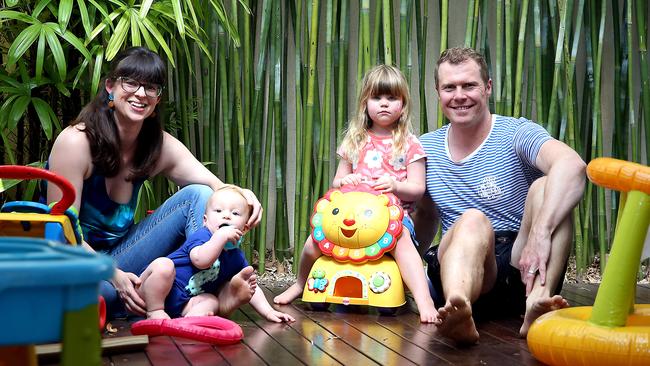Working parents tell of when it all gets too hard
Two in three parents are struggling with their physical or mental health due to the competing pressures of family and work.

Two in three parents are struggling with their physical or mental health due to the competing pressures of family and work, and one-third of parents admit it is contributing to stress and tension in their relationship, a new survey reveals.
The new National Working Families Report, to be released on Tuesday, offers a grim picture of Australian parents failing to cope with managing career and family, and feeling like they’re failing at both.
The survey of more than 6000 parents finds two-thirds are feeling too emotionally or physically drained when they get home from work to contribute to their family, and half missed out on family activities in the preceding month due to time at work.
Parents at Work CEO Emma Walsh, who commissioned the survey, said “one in four parents and carers reported an increased intention to leave their jobs in the next 12 months because they are struggling to combine caring with their job”. “Politicians constantly talk about working families,” Ms Walsh told The Australian. “These results suggest that we need to take a hard look at how they are faring.”
For father of two Rob Sturrock, from Sydney’s northern beaches, the findings come as no surprise. Mr Sturrock is just finishing up a term of parental leave, and while he has greatly valued the time with his children and is grateful to his employer’s flexible arrangements that allowed him to step into the primary carer role, he is under no illusions about the stresses of navigating the demands of his job in public policy and those of having a family.
“It has had a huge impact on me,” Mr Sturrock said. “It was at its worst when I first went part time, to four days a week, but was still carrying a full-time workload. We also had a child who caught all the things you catch in daycare in winter. She was getting sick a lot, I was getting sick a lot, but it was hard to find time to look after myself. It was a real struggle and it took a toll on me mentally.
“There was a period of eight or nine months when I was going to therapy at least once a fortnight to deal with the pressure.”
Mr Sturrock said he still knew lots of men who had a negative view of other men making flexible working arrangements when their children were young.
“Why are you at home? Are you on holidays? Are you having the day off? They’re the questions you get when it’s actually the most stressful time of your life,” he said.
Ms Walsh called for a national working families framework to be designed and implemented by business, government and the community. “We need to address the gender bias around caring and parental leave,” she said. “We need to disrupt the breadwinner-versus-caregiver cultural barriers that hold back gender equality.”
The survey, which received 80 per cent of its responses from women, reveals flexible work is still seen as primarily the preserve of women, with more than two-thirds agreeing it is more acceptable for women to use family-friendly work options than men.
It also found one-third of parents and carers missed opportunities for promotion due to their use of flexible work, an issue more common for women (35 per cent), than men (14 per cent).




To join the conversation, please log in. Don't have an account? Register
Join the conversation, you are commenting as Logout